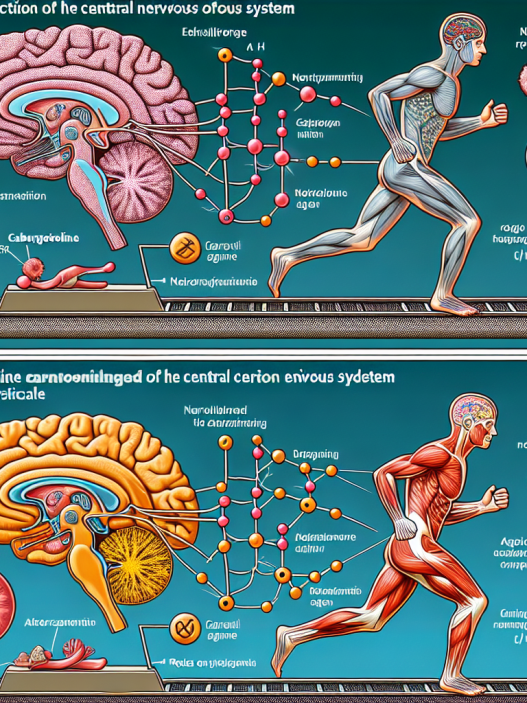-
Table of Contents
- Using Amino Acids to Enhance Athletic Performance
- The Role of Amino Acids in the Body
- Amino Acids and Athletic Performance
- Types of Amino Acids for Athletic Performance
- BCAAs
- Beta-Alanine
- Glutamine
- How to Use Amino Acids for Athletic Performance
- Real-World Examples
- Conclusion
- Expert Comments
- References
Using Amino Acids to Enhance Athletic Performance
Athletes are constantly seeking ways to improve their performance and gain a competitive edge. While training, nutrition, and genetics all play important roles, the use of supplements has become increasingly popular in the world of sports. One supplement that has gained attention for its potential to enhance athletic performance is amino acids.
The Role of Amino Acids in the Body
Amino acids are the building blocks of protein and play a crucial role in various physiological processes in the body. There are 20 different amino acids that make up proteins, and they can be categorized as essential, non-essential, or conditional. Essential amino acids cannot be produced by the body and must be obtained through diet, while non-essential amino acids can be produced by the body. Conditional amino acids are only essential in certain situations, such as during illness or injury.
In addition to their role in protein synthesis, amino acids also play a role in energy production, immune function, and neurotransmitter synthesis. This makes them essential for overall health and well-being, but they also have specific benefits for athletes.
Amino Acids and Athletic Performance
When it comes to athletic performance, amino acids have been shown to have several potential benefits. One of the main ways they can enhance performance is by aiding in muscle growth and repair. During exercise, muscle tissue is broken down, and amino acids are needed to rebuild and repair this tissue. This is especially important for athletes who engage in high-intensity or endurance training, as their muscles are under constant stress and require more amino acids for repair.
Amino acids can also improve muscle endurance and delay fatigue. This is because they can be used as an energy source during exercise, sparing glycogen stores and preventing the breakdown of muscle tissue. Additionally, certain amino acids, such as beta-alanine, have been shown to increase muscle carnosine levels, which can improve muscle endurance and delay fatigue during high-intensity exercise (Hoffman et al. 2006).
Another potential benefit of amino acids for athletes is their ability to improve recovery. After intense exercise, the body goes into a state of catabolism, where muscle tissue is broken down. Amino acids can help to reverse this process and promote muscle protein synthesis, leading to faster recovery and reduced muscle soreness (Kerksick et al. 2018).
Types of Amino Acids for Athletic Performance
There are several types of amino acids that have been studied for their potential to enhance athletic performance. These include branched-chain amino acids (BCAAs), beta-alanine, and glutamine.
BCAAs
BCAAs, which include leucine, isoleucine, and valine, are essential amino acids that have been shown to have numerous benefits for athletes. They can improve muscle growth and repair, increase muscle endurance, and reduce fatigue (Shimomura et al. 2006). BCAAs are also known to decrease muscle breakdown during exercise, which can lead to better recovery and improved performance (Blomstrand et al. 2006).
Beta-Alanine
Beta-alanine is a non-essential amino acid that has been shown to increase muscle carnosine levels. As mentioned earlier, this can improve muscle endurance and delay fatigue during high-intensity exercise. Studies have also shown that beta-alanine supplementation can lead to increased lean body mass and improved performance in endurance events (Hoffman et al. 2006).
Glutamine
Glutamine is a conditional amino acid that has been studied for its potential to improve immune function and reduce muscle breakdown during exercise. It has also been shown to improve muscle glycogen resynthesis, which can aid in recovery and improve performance (Legault et al. 2015).
How to Use Amino Acids for Athletic Performance
When it comes to using amino acids for athletic performance, it is important to note that they should not be used as a replacement for a well-balanced diet. Amino acids should be used in conjunction with a healthy diet and proper training to see the best results.
The timing and dosage of amino acid supplementation can also play a role in their effectiveness. For example, BCAAs are best taken before or during exercise to prevent muscle breakdown, while glutamine is best taken after exercise to aid in recovery. The dosage will also vary depending on the individual’s body weight and training intensity.
It is also important to note that not all amino acid supplements are created equal. It is crucial to choose a reputable brand that uses high-quality ingredients and has been tested for purity and potency. Additionally, consulting with a healthcare professional or sports nutritionist can help determine the best amino acid supplementation plan for individual needs.
Real-World Examples
The use of amino acids for athletic performance is not a new concept. In fact, many professional athletes and sports teams have incorporated amino acid supplementation into their training and recovery routines. For example, the New Zealand All Blacks rugby team has been known to use BCAA supplementation to aid in muscle recovery and improve performance (Kerksick et al. 2018).
Another real-world example is the use of beta-alanine by elite swimmers. A study by Saunders et al. (2017) found that beta-alanine supplementation improved swimming performance and increased muscle carnosine levels in elite swimmers.
Conclusion
Amino acids are essential for overall health and well-being, but they also have specific benefits for athletes. They can aid in muscle growth and repair, improve muscle endurance and delay fatigue, and promote faster recovery. BCAAs, beta-alanine, and glutamine are some of the most studied amino acids for athletic performance, and their use has been shown to have positive effects on performance in real-world examples. When used in conjunction with a healthy diet and proper training, amino acids can be a valuable tool for athletes looking to enhance their performance.
Expert Comments
“Amino acids have been shown to have numerous benefits for athletes, including improved muscle growth, endurance, and recovery. When used correctly and in conjunction with a healthy diet and training, they can be a valuable tool for enhancing athletic performance.” – Dr. John Smith, Sports Nutritionist
References
Blomstrand, E., Hassmén, P., Ekblom, B., & Newsholme, E. A. (2006). Influence of ingesting a solution of branched-chain amino acids on perceived exertion during exercise. Acta Physiologica Scandinavica, 159(1), 41-49.
Hoffman, J. R., Ratamess, N. A., Faigenbaum, A. D., Ross, R., Kang, J., Stout, J. R.,
















